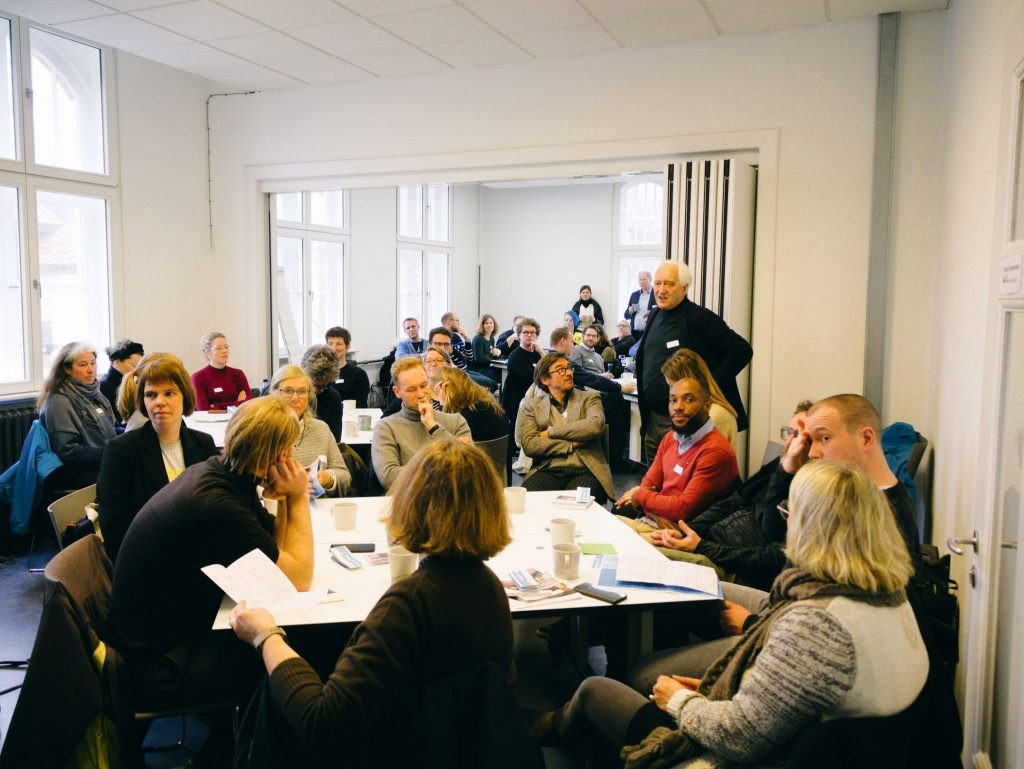Charles Landry is not only one of the global kingpins behind cultural planning, author, speaker and international adviser on the future of cities. He also was one of the main “concert masters” at UrbanLab Kiel taking place from 24 – 25 February, 2020. We managed to pull him off the duties for literally five minutes to ask five important questions about cultural planning and creating dialogues. Read the interview to learn more about the project and why the Baltic Sea Cultural Centre participates in it.
What do you think was the breaking point to start thinking about cultural planning in general?
At first, I was born to German parents who moved to the UK. Then I studied at school in Germany and, at some point, went to university in Italy. So, pretty early I had three cultures in my mind already. That affected me, and I always asked myself – who am I, where am I going? There was also a dramatic restructuring in Europe at the time, thinking on how one can use the resources. People started looking at culture in a broad sense like me – “who am I” type of questions related to habits, behaviours, attitudes, but also in a narrow sense – culture as arts. The reason it was important initially, was that places were declining, and many were looking around asking – what else have we got?
Personally, my breaking point was when I realized we have made a mistake back then. When me and my colleagues were developing ideas of cultural planning, people thought we are building cultural institutions or only thinking about creative industries. Whereas, we needed to start “thinking in a cultural way”, which is understanding the culture of a place. And, by understanding it, you might be able to work out your way forward in this urban ecosystem.
What places a city or town need for community and municipal planners to have fruitful exchanges?
What we want in a city is a cultural openness and curiosity, and a culture of dialogue. Because the city is basically a place where strangers meet, more than in other places. That’s why the question of gathering spaces, the public sphere or public realm becomes very important. We need physical spaces for culture conversation. In fact, often old or industrial areas (ironically, usually in horrible conditions) are those generating the real interest. But that is only one category where you can have a culture conversation. The problem is that they are often seen as alternative to a limited range of demography. Even if the spaces are encouraged, they are still found unattractive. Meanwhile the classic, historic spaces for discussion are municipality tied buildings that people often find intimidating nowadays.
Which cities or towns do you think could be called the champions of urban cultural planning?
If you take a helicopter and view cities from the top, there are always interesting projects everywhere. The question is – does it all cluster together? Is this a place that takes cultural planning seriously? Then you must go back to places like Amsterdam that’s quite an open and enabling place. I think you must mention Copenhagen as well. It doesn’t have to be such big places necessarily, it can be something that is just confident about itself like Aarhus in Denmark, Ghent in Belgium, or Manheim in Germany. The size is not necessarily of the essence. Obviously, you’ve got a funny paradox – the bigger a place is the less likely you feel the collective conversation because there’s so much diversity. But the smaller the place is, the harder it is to change.
What would be the first steps to take in order to start planning culturally?
I think the very first step is to want to have an ambition to move forward. Sometimes “moving forward” might also mean keeping things as they are, but it can still include adjusting to the contemporary world, say, digitalization, or the fact that younger people’s experience of the world is obviously different from someone who’s 50 or 60. What I think is incredibly important is somehow to start a conversation about anything. Now, often a big cultural programme can do that when cities become “capitals of culture”, when it’s used as a context to encourage this dialogue.
After all, the very, very first step – is the attitude of mind. It’s curiosity and openness, and willingness to listen. There are many cities that are successful at it in some sense, but is their success purely the fact that they built lots of buildings or transport systems? What about the community building? The dialogue is obviously another one of the big things.
If someone says we have come this far without urban cultural planning, why do we even need it, what would you answer?
This is a good question. I sometimes answer with a sentence that I picked up and adapted from someone else. For so long I have been asked to prove why is culture, creativity, design, or artistic thinking important. That forces you to defend yourself, you have to then calculate it economically or in jobs, or whatever social impact it does. But I now say not what is the value of taking matter to account, but what is the cost of not? What is the cost of neglecting culture or artistic thinking? That forces the other person to justify instead and find out the answer to the question oneself.
The interview comes from UCP's official website.
More on our role in the project here.

